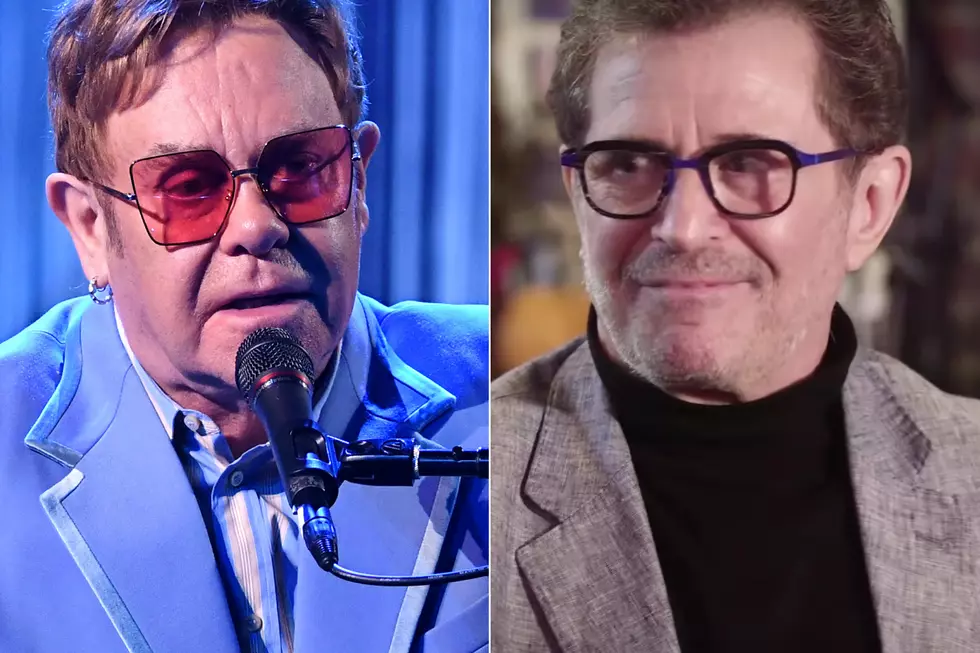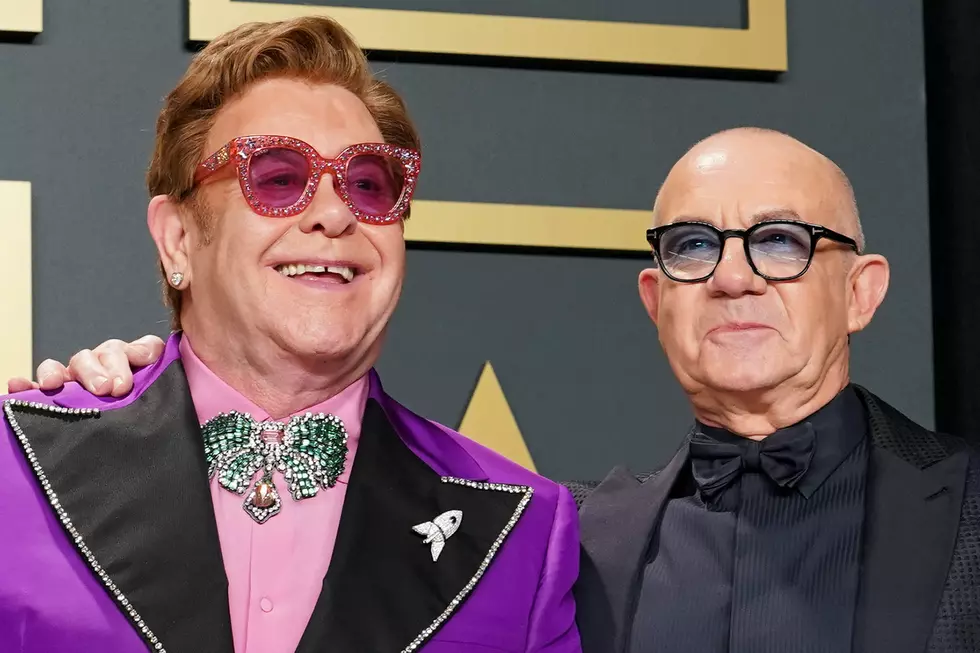
How Gentle Giant’s Derek Shulman Surprised Ex-Bandmate Elton John: Exclusive Interview
Famous for fronting Gentle Giant from 1970-80, Derek Shulman found early success with a British pop group called Simon Dupree and the Big Sound.
The seeds for his next phase were already planted, since the lineup included siblings and future Gentle Giant bandmates Phil and Ray Shulman. But Simon Dupree and the Big Sound scored some U.K. hits of their own, including "Kites," before morphing into one of prog-rock's most interesting acts.
They also placed an early spotlight on Reginald Dwight – the future Elton John.
Shulman talks to UCR about a more recent reunion with John, as well as other career intersections in a journey that took him to the upper echelons of the music industry. He later signed Bon Jovi, Cinderella and Enuff Z'nuff while at PolyGram, then Dream Theater and Pantera while with Atco. Roadrunner Records signed Slipknot and Nickelback during Shulman's tenure as president, as well.
You recently reconnected with Elton John. It's very inspiring how your paths converged just briefly, then diverged in such a major way, but both Gentle Giant and Elton John wound up committing so clearly to your visions. What was that conversation like, and have you stayed in touch over the years?
From time to time, actually. It was a strong period for both of us when we met. Elton was Reg at the time, and the keyboard player in my first group was sick. He was recruited by our manager, and he loved playing with us. He's a real muso. We went to his house, and this was around the time when [lyricist Bernie Taupin] came down from Lincoln. This was literally the start of his Elton John period and career. We became close friends, especially [with] Ray [Shulman] and myself. We kind of whispered in Elton's ear that we were thinking about breaking the band up and doing something very new. He loved that thought. He said, "I'd love to discuss with you what you want to do. I've written some songs." He played "Your Song" and "Skyline Pigeon." And that was right when Bernie arrived in the living room of his house. We didn't say it, but we thought, "This isn't really where we want to go," and thank God for him! He said, "I'm changing my name to Elton John," and we said, "Well, that won't work." Of course, the year after, he became Elton John and became massive, and good for him. But we were there when he was doing his first album. We remained friends, even though he wasn't a part of Gentle Giant — lucky for him. He was at the Troubadour becoming massive, and we were scrambling for gigs. We stayed in touch over the years but kind of lost touch over the last couple decades. I reached out [recently], and it was fantastic. We recorded a couple songs in my first group that Elton wrote, and I had the demo in my closet of Elton singing the song "I'm Going Home." He'd forgotten about it. I gave it to him, and he didn't have it in his library. I'm seeing him again in a few weeks, actually. It was great to give him back a song that he'd forgotten he'd written. He also played on a couple other tracks that never came out as singles.
Listen to Simon Dupree With Elton John
That's wonderful. You gave him a piece of his past he didn't know existed.
It was very funny that he'd forgotten he'd written that. It was a fun time.
You also recently caught up with Pantera singer Phil Anselmo. You tweeted about seeing them in a tiny Texas club, and being blown away before you signed them to a record deal. Could you talk a little bit more about that show?
I signed some fairly big bands at PolyGram, and I went on to become president and CEO of Atco Records. Toward the end of the PolyGram time, I'd seen a couple videos of this band Pantera from Texas. Sonically, they sounded amazing, but I [didn't want to sign them] because I was gonna leave and I had an offer to run a company. As soon as I was running Atco, I had some people working for me, and I knew Pantera were playing a couple venues. I had a scout down in Texas, and I said to him, "Go see this band Pantera I've been interested in." He traveled 200 miles to see them in Arlington, Texas. He called me about three songs in and said, "This band is amazing. You have to come see them." The week after, they were playing another show at the same venue. As a record-company guy now, I went there with the hope that I'd see something that would work or wouldn't work — and if it doesn't work, you don't sign them. I went down, knowing the business as I did then, having come away from PolyGram, and I knew within three songs that they were different. They were such superb players that presented their music incredibly well. I became a fan. I went back to speak to them, and they were party animals, that's for sure. But they were superb. The crazy thing was that no one else was interested in this band. I was absolutely blown away by them. I just knew they had "it." I knew they wouldn't get on MTV or the radio, but being a record guy and being blown away immediately, I knew that people would love this band. I signed them, knowing they wouldn't be a TV and radio favorite, but would blow people away live. I put all the marketing dollars onto supporting them on the road, and sure enough, when they played anywhere, they come back three months later and play to 10 times more people. The word of mouth was astounding. When Cowboys From Hell came out, the buzz was already there.
It's amazing that you got that feeling from a few songs.
It's very rare, but when you have it — if you could can it and sell it, you could make billions. There are certain artists where you know instinctively: "This band has it."
Listen to Gentle Giant Perform 'Playing the Game'
You've mentioned the possibility of an animated film based on Gentle Giant's 1974 album, The Power and the Glory. Have there been any developments on that front?
We talked about it, actually, and it kind of went off the boil. I still think it could be very interesting, especially in this day and age. Obviously lyrically, it's something that's very "today" all over the world, which is sad but true. It was written to reflect the [President Richard] Nixon-ian period, but we are going through even worse here. We put it on ice for the time being, but it may be something we can get involved in next year. I'm going to speak to Ray about that in the coming weeks.
I've read that you had the opportunity to produce other artists before you accepted your job at PolyGram in 1982. Did you have offers to work with any particular artists?
I had a couple offers in the prog world: [Former Yes keyboardist] Patrick Moraz and some other people. I thought about it, but the studio work was always work. I enjoyed it for Gentle Giant, but to lock myself in a space without air and everything else for a period of time is not what I wanted to do. When Gentle Giant was over, we were all at kind of a loss. But we knew the band should end at that period. I thought about the couple of offers that came my way, but I dismissed them. The next chapter was going on the business side. I got a call from a friend who said, "Why don't you think about coming to work for PolyGram?" That was in New York. I remember the first day I went there and went around the offices and literally realized that the music business wasn't the music business — it was the business of music. Each office had their own agenda. Then it kind of made sense to me about Gentle Giant not being as big as they should've.
Listen to Gentle Giant Perform 'Two Weeks in Spain'
I know you've said you're fine, in retrospect, with the band breaking up in 1980. I know the creative juices weren't flowing at that time, and no one knew what direction to take. Of course, most progressive bands were breaking up around then, but some of the bigger bands managed to keep going by adapting their sound slightly, like Genesis and Yes. I've always felt like your songs, even at their most complicated, are very catchy — like "Two Weeks in Spain," for example. Do you feel like there was a way forward but you just couldn't find it? Or do you think Gentle Giant couldn't exist in the '80s?
Let me put it this way: If I had the knowledge back then of what I've had in the subsequent four decades — of not just what it takes to get a hit single on the radio and elevate the band to a different level — perhaps it would have happened. But in retrospect, being a Monday-morning quarterback is kind of dumb. So in certain respects, I'm glad it didn't happen. I would have hated to continue and become a parody of what we were. When people say, "Why don't you do another show or reunion tour?," well, we're 35-40 years older than our last gig. It's one thing for the fans to see you onstage, but for us, it would be the worst thing possible to be a parody of what we were. I see a lot of that unfortunately, and it makes me wince and cringe — for me, not for the artists onstage, because it's up to them how they want to live their lives. But I don't want to be that person. You have to go forward. And I'd hate to regurgitate some of these things we did 40-50 years ago. If you go onstage and you need a cane or a walker, you're not jumping around like you used to, it's not for me and not for us. And that's okay. The best thing to leave — and I hate to use the word — is a legacy, and good memories instead of "I saw them last week, and they were awful because they were old and couldn't play their instruments as well." I'd rather that didn't happen — not for money, not for anything.
A lot of great bands have really patchy periods. But Gentle Giant has such a tight catalog: one decade, 11 studio albums and one live album, quality music on all of them. Not many bands can say that.
Looking back, it was the right time [to stop]. It wasn't for us. We weren't going to be Genesis or Yes, and that's okay. We all moved on. It was the end of a chapter, and we all loved the chapter. It was superb. And when you asked earlier about nostalgia, it's not nostalgia at all. One thing I would hate to revel in is nostalgia. We can look back and objectively enjoy what was. I hear things we put together that I'd forgotten about, and they're fun to listen to. On the other side of the fence, being on the business side, I listen and say, "Wow, we were good!"
How Rock's Biggest Acts Got Their Names
More From Ultimate Classic Rock









